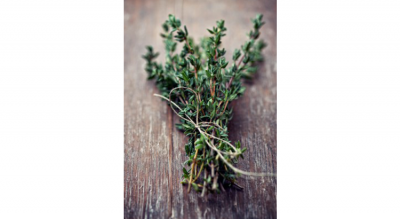Herbal Remedy: Can you use thyme as a medicinal cure?
mis à jour le 14 July 2015 à 18:30Whether as an essential oil, used in infusion or hydrosol form, this fragrant aromatic herb fights against mouth ulcers, small colds and intestinal infections.
There are numerous varieties of thyme that differ in their chemical composition. “All are antiseptic and antispasmodic. They contain approximately from 1 to 2 % of essential oils,” specifies Julien Duchesne, pharmacist and founder of a Herbalist shop. Duchesne also proposes using two varieties in an infusion, the regular thyme and the lemony thyme, which is softer. To stop the onset of a cold, calm a cough or facilitate digestion after a meal, include 1 teaspoon per cup of herbal tea, cover and let it infuse for 5 - 10 minutes before filtering out. We can give lemony thyme to children over the age of 18 months. “The thyme is self-sufficient, it is not necessary to use it in mixture,” specifies the pharmacist. Add it at the end of cooking (to stir fried vegetables or sautéed potatoes) or use it to season salads even.
The hydrosol of an aromatic plant is extracted during its distillation. It contains the hydrosoluble agents of the vegetable and a small quantity of essential oil. Do ensure that you buy hydrosol without conservatives, that is intended for consumption. We find numerous varieties of hydrosol of thyme. The easiest to use for its sweetness is the hydrosol of thyme with linalool. “It is a good disinfectant, which we use in its pure form to clean small wounds. Half mixed with some physiological salt solution, it allows us to cure colds. It is also useful for gargling or as mouthwash if we have a sore throat or mouth ulcers,” explains the pharmacist.
In this case, dilute 1 tablespoon in 1/2 glass of water. Additionally, you can have 1 teaspoon a day in a glass of water for one month to strengthen the immune system.
The essential oil (H.E) of regular thyme with linalool is anti-infective soft but effective and has to be applied “internally to stop intestinal infection or externally to alleviate ENT issues,” indicates Julien Duchesne. Use for no more than 3 or 4 consecutive days. To take internally, place 1 drop in 1 teaspoon of honey 2 to 3 times a day. For external use, mix it with other essential oils (eucalyptus radiata, tea tree) for a synergistic effect. Pour 2 drops of each into 1 teaspoon of olive oil and massage the throat area twice a day. “The eucalyptus is mucolytic, and the thyme is antibacterial as is the tea tree.”
We find numerous other varieties of thyme distilled in essential oil. Thyme with thujanol, although more difficult to find and more expensive, is rather soft. It is an excellent antibacterial (effective for the gynaecological infections) and an anti-viral ingredient. Thyme with thymol is a very powerful disinfectant, and has to be used with caution because of its causticity. Do not take H.E. of thyme if you are pregnant or breastfeeding. It is also not suitable for children younger than 3 years.
Martine Azoulai




